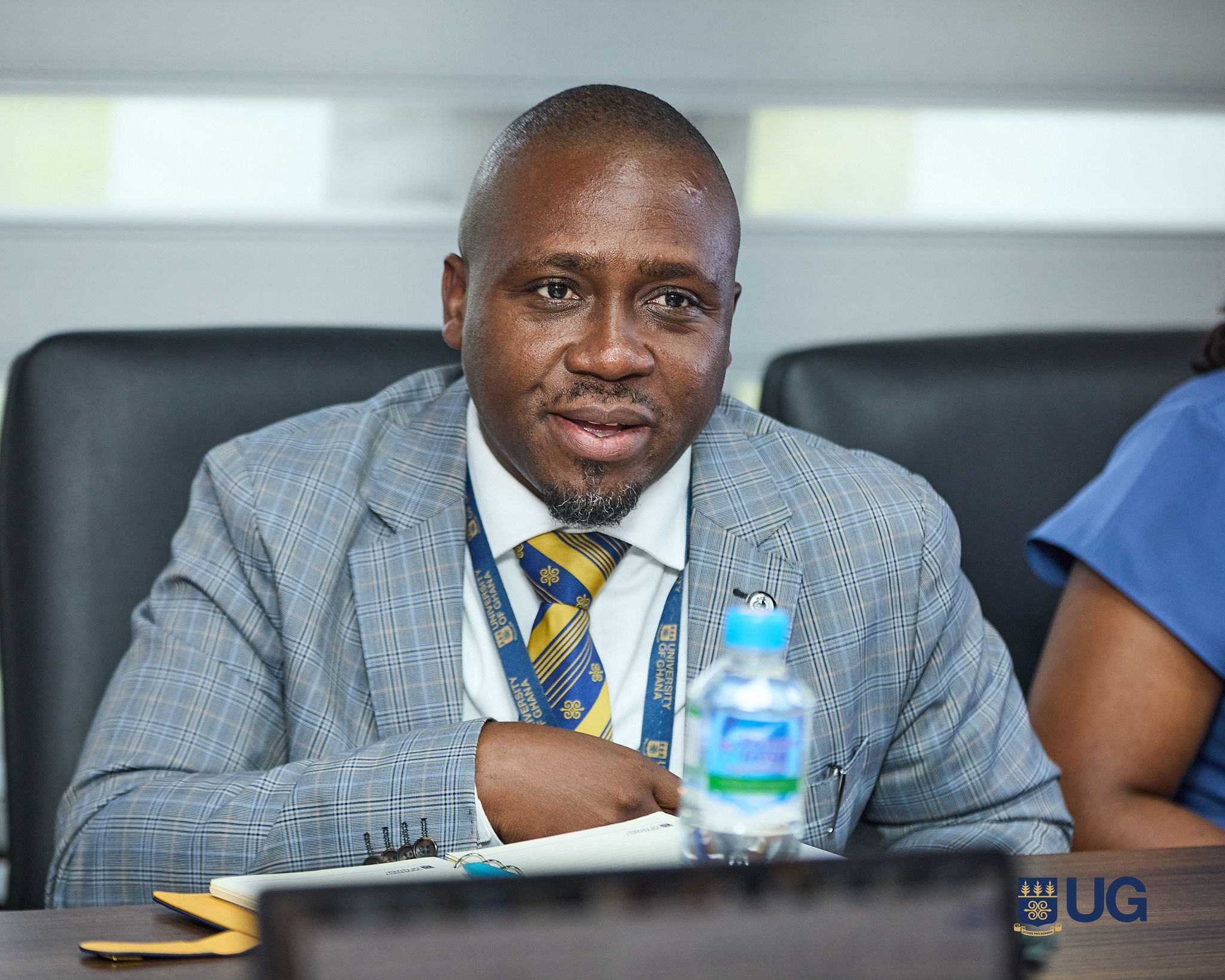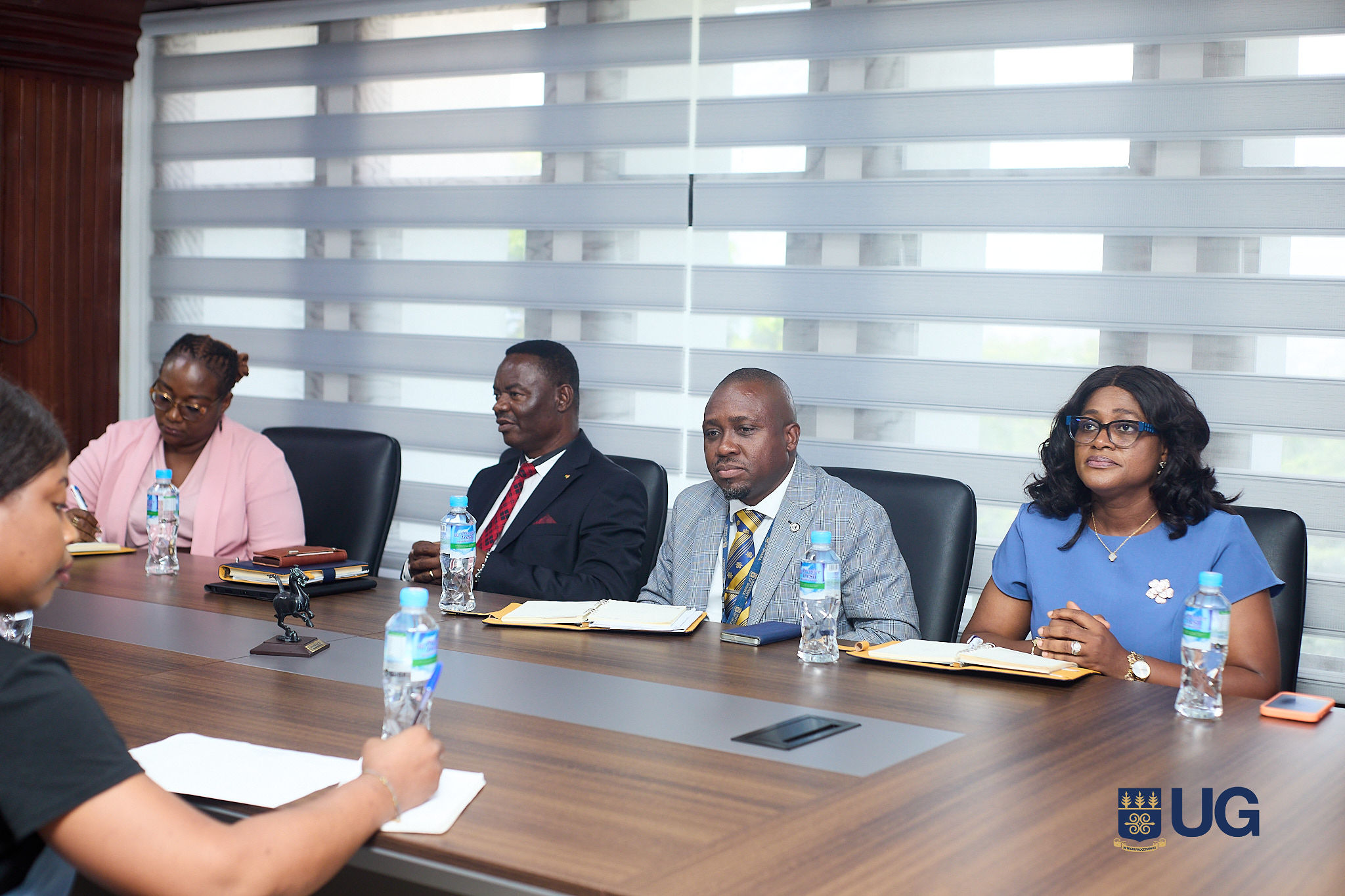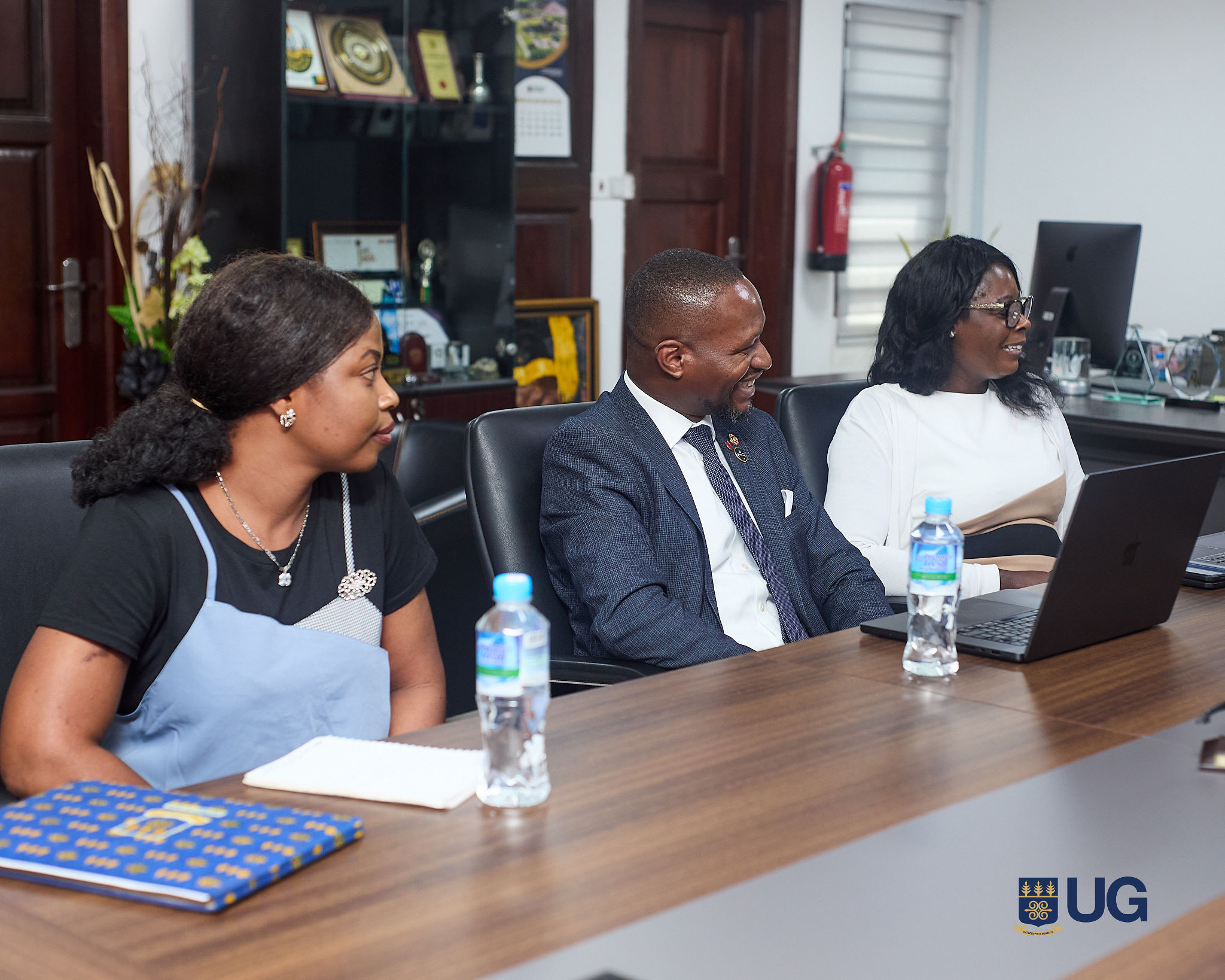UG and University of Greater Manchester Engage on Partnership for Digital Youth Village Project

A team from the University of Greater Manchester has held discussions with the Vice-Chancellor of the University of Ghana, Prof. Nana Aba Appiah Amfo, as part of formal processes toward a strategic partnership to support the Digital Youth Village (DYV) and the Centre for Digital Youth Development (CDYD).
Discussions during the meeting, held at the Vice-Chancellor’s office, centred on exploring collaboration in health, technology and innovation, which form part of the key thematic areas under the DYV initiative.
Prof. Faye Ruddock, Director of the Institute of Health Equity and Social Justice at the University of Greater Manchester, expressed appreciation to the Vice-Chancellor for the opportunity to engage in discussions on matters of mutual interest.
Prof. Ruddock, who also serves as Chair of Health Equity of the University and Founding Chair of the Caribbean & African Health Network, highlighted the importance of cross-sectoral health initiatives, particularly those that address health in the workplace. She noted that her university remains committed to expanding its reach through meaningful international collaborations.

In her response, Vice-Chancellor Prof. Amfo described the meeting as both insightful and inspiring, particularly because of the team’s expertise and the shared areas of interest. Recalling her recognition as the Association of African Universities’ (AAU) Ambassador for Gender Equity and Social Inclusion, she noted that addressing inequities in health remains a global challenge that demands collective effort.
Prof. Amfo explained that health has been identified as one of the key thematic areas under the Digital Youth Village concept. While the physical structures of the DYV are still under development, she said the conceptual framework and partnerships are already taking shape, with themes such as health, artificial intelligence and technology being integrated into the initiative.
She was of the view that achieving such ambitious goals requires strong collaboration, which is in line with the University’s fourth strategic priority, Engagement and Partnerships. “We recognise the possibilities, but we also know that it is virtually impossible for us to get there alone. We want to see these results in our lifetime,” she remarked.
Touching on the intersection between health and work, Prof. Amfo commended the University of Greater Manchester’s focus on workplace well-being, observing that it aligns with UG’s third strategic priority, Commitment to Faculty and Staff, under which efforts have been made to promote preventive healthcare and wellness within the University community, including initiatives such as the annual Pink October campaign.

She revealed that the University will soon hold its first Employee Week to reinforce staff welfare and productivity. “If we are thinking about productivity, we must equally be concerned about the well-being of our staff. These are all connected and our priorities reflect that,” she stated.
She further remarked that, through the University’s second strategic priority, Impactful Research, UG continues to advance research that shapes policy and enhances the well-being of communities.
Joining the meeting virtually, Dr. Julian Coleman, Assistant Vice-Chancellor (Knowledge Exchange) at the University of Greater Manchester, commended the discussions for the partnership between the two institutions, describing it as one that will be built on shared values and mutual goals.
He explained that the University of Greater Manchester is a “student and people-focused institution” committed to ensuring that individuals live fulfilling lives while contributing to regional and global development.
Dr. Coleman highlighted Manchester’s recent achievements, including the opening of its first undergraduate medical school, a long-established engineering school and efforts to integrate both fields to drive innovation in medical research and health technology.

He also underscored his University’s commitment to health equity and inclusive education, stating that issues of inequality are central to their programmes in nursing, midwifery, social work and youth development. “We are a widening participation university and we are deeply committed to creating opportunities for those who would not otherwise access higher education or research advancement,” he added.
He concluded by noting that the Digital Youth Village project strongly aligns with his Insitution’s vision, saying, “When we heard about the Digital Youth Village, it struck a chord with us. We are excited to build on this foundation and to collaborate on technology, health and research innovation.”
Speaking earlier at the meeting, Dr. Jack Andrews Dotsey, Deputy Director for Partnerships & Resource Mobilisation for the Digital Youth Village (DYV), representing the Dean of the School of Continuing and Distance Education (SCDE) and Director of DYV, provided an update on the progress made so far. He noted that since the assumption of office by the current government, the DYV facility had undergone audits and received clearance for work to continue. He added that the Ministry of Communication, Digital Technology and Innovation has been actively engaged to ensure that all necessary measures are taken to accelerate the completion of the facility.

Dr. Dotsey further explained that the project team is working to secure funding and partnerships globally, that will support the development and take-off of the DYV. Institutions across Europe, he said, are being engaged to contribute expertise, resources and technical assistance toward realising the vision of the University.
He mentioned that such collaborations have made the meeting with the team from the University of Greater Manchester particularly significant, given their shared expertise in health and technology innovation.
On his part, Prof. Simon-Peter Kafui Aheto, Esq, who is the Deputy Director with responsibility for Programmes at the DYV, disclosed that the University of Ghana has a long history of collaboration in health and technology-related initiatives. He expressed optimism that discussions with the University of Greater Manchester will formalise new partnerships in areas such as research funding, programme development and capacity building.

Also speaking, Dr. Charles Kwaku-Odoi, Chief Executive Officer at the Caribbean & African Health Network, noted that the health landscape in the United Kingdom requires major interventions, which led to the establishment of their organisation through Prof. Faye’s funded PhD project. He said their engagement with the DYV aligns with the agenda of the Network with emphasis on preventive healthcare, adding that the initiative to digitise health data and health information resonates strongly with the DYV’s vision.

The Digital Youth Village & Centre for Digital Youth Development (DYV-CDYD) at the University of Ghana seeks to tackle youth unemployment by promoting digital entrepreneurship, innovation and skills development. Implemented in partnership with the Ministry of Communication, Digital Technology and Innovation and the Ministry of Finance, the initiative bridges policy, academia and industry through hands-on training and business incubation. Its mission is to empower the next generation for a holistic digital future, with a vision to become Ghana’s leading centre for digital innovation, transformation and youth entrepreneurship.
